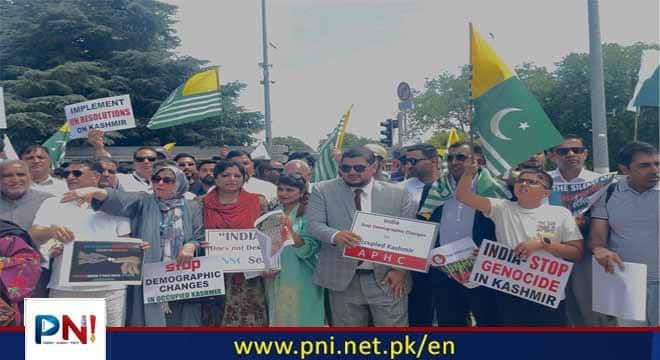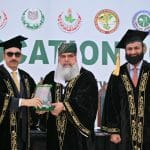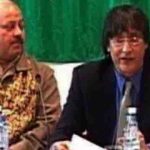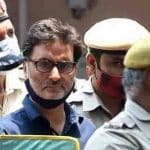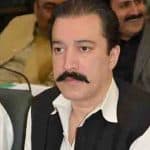Geneva, Switzerland (PNI) In a powerful display of unity and defiance, hundreds of Kashmiris and human rights activists gathered outside the United Nations Human Rights Council (UNHRC) headquarters in Geneva to protest against what they described as India’s systematic and ongoing violations of human rights in Indian-occupied Jammu and Kashmir. The demonstration coincided with the UNHRC’s ongoing session, aiming to draw international attention to the decades-long conflict and what protesters termed a worsening humanitarian crisis.
Chanting slogans such as “Free Kashmir,” “End the Occupation,” and “Justice for Kashmir,” the protestors carried placards condemning India’s actions and demanding urgent global intervention. Many waved Kashmiri flags and held portraits of political prisoners, reinforcing the emotional and political gravity of the gathering.
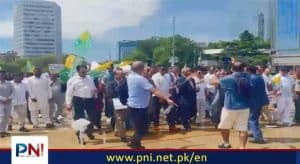
The protest was led by several high-profile Kashmiri leaders and activists. Among them were Ghulam Muhammad Safi, Convener of the All Parties Hurriyat Conference (APHC); Altaf Wani, head of the Kashmir delegation to Geneva; Chaudhry Pervez Ashraf, former Minister of AJK; and Fahim Kayani, President of All Parties UK , Ms Shameel Shawl, Fiaz Naqshbandi, Naeem Ch , Sardar Amjad Yousaf . Their presence gave weight to the demonstration, underscoring that the protest was not merely symbolic, but part of a coordinated political campaign to internationalize the Kashmir issue.
During speeches delivered to the gathered crowd and international media, the leaders condemned India’s military occupation of Jammu and Kashmir, calling it a blatant denial of the Kashmiri people’s right to self-determination as recognized under numerous United Nations resolutions. Speakers highlighted the use of excessive force by Indian troops, the prolonged communication blackouts, arbitrary detentions, and severe restrictions on freedom of speech and assembly in the region.
Fahim Kayani, addressing the crowd, said, “The world cannot remain silent while Kashmiris are imprisoned, silenced, and stripped of their identity. This protest is a message to the UN that its inaction is being noticed, and justice delayed is justice denied.” His remarks were met with strong applause from the demonstrators, emphasizing the deep frustration of the Kashmiri diaspora over the lack of international response.
A key demand echoed throughout the protest was the immediate and unconditional release of all Kashmiri political prisoners. Names such as Shabir Shah, Yasin Malik, Asiya Andrabi, Musarrat Alam, and Dr. Abdul Hameed Fayaz were invoked repeatedly. Protesters alleged that these leaders have been detained under fabricated charges, subjected to inhumane treatment, and denied essential medical care—actions that they claim violate international legal norms, including the Geneva Conventions and the Universal Declaration of Human Rights.
Another major concern raised was the ongoing demographic changes allegedly being orchestrated by the Indian government in the region. Protest leaders accused India of issuing new domicile certificates to non-Kashmiris and facilitating the settlement of outsiders in the region, thereby attempting to dilute the ethnic and religious identity of Kashmiris. “This is not just an occupation; it is an attempt at cultural and demographic erasure,” warned Altaf Wani. Protesters claimed such actions were in direct violation of the Fourth Geneva Convention, which prohibits an occupying power from transferring parts of its own civilian population into the territory it occupies.
A recurring theme in the protest was the urgency of UN intervention. Protest leaders implored the international body to take immediate and concrete steps to halt the abuses in Kashmir, initiate a fact-finding mission, and facilitate dialogue between all stakeholders for a peaceful resolution of the conflict. They also appealed to the European Union, Organization of Islamic Cooperation (OIC), and other global human rights watchdogs to break their silence and exert pressure on India to comply with international human rights obligations.
Speakers warned that the Kashmir dispute, left unresolved, continues to pose a serious threat to regional and global stability. “The risk of a full-blown war between two nuclear powers—India and Pakistan—is real,” said Ghulam Muhammad Safi. “And the world cannot afford to ignore this any longer.”
The protest drew attendees from across Europe, including sizable delegations from Italy, France, Spain, Germany, and the United Kingdom. Human rights organizations, student groups, and members of the diaspora community came together in solidarity, making the event one of the largest Kashmir-related demonstrations in Geneva in recent years. Their presence helped amplify the message that the Kashmir conflict is not just a regional issue, but a global human rights concern.
As the protest concluded, organizers vowed to continue raising awareness at international forums and pledged to keep the momentum going until the voices of the Kashmiri people are heard and their right to self-determination is realized.
Follow the PNI Facebook page for the latest news and updates.


